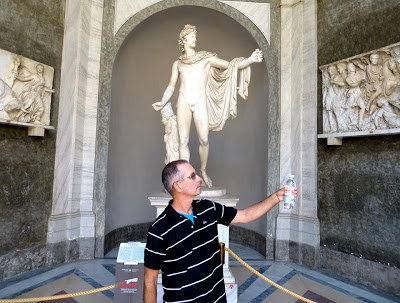I’ve recently returned from a month in Europe, so recent
that I’m still suffering from jet lag. One of the highlights of my trip was the
city of Rome.
Resplendent Rome—a silky blue dome vaulting over sun-baked
piazzas, Bernini fountains, crumbling monuments, stone cathedrals, and a
labyrinth of shop-lined streets.
I love Rome. Like San Francisco, it spreads over seven
hills, but the similarity ends there. The architecture, climate, even the
inhabitants’ musical chatter whiffing down the narrow streets all have a
different texture. Romans are charmingly unhurried; they lounge in piazzas,
trundle down sleepy back streets, and take joy in simple things. They love
drama and seem to over-emphasize everything just so they can make an eloquent
show in the telling. This is the Rome I wandered in for seven days, its ancient
beauty and expressive people, half enchanted isle and half tourist trap. It
infused me with an intoxicating sense of adventure.
I’ve traveled to Rome several times in the last twenty
years. All my previous visits occurred in the September-October time frame.
This trip, however, came in June, the beginning to the hot, tourist season. I
will not make that mistake again. Rome in summer is uncomfortably warm (this
coming from a man who lives in the So-Cal deserts) and unpleasantly crowded
with young tourist, mostly of the American genera. Unlike Venice, Rome is spread over a wide area
and has hoards of cathedrals, monuments, piazzas, and restaurants so visitors
are spread thin. It also has an underground train that crosses the city so
seeing it all is no problem. The only issues I had with crowding was at Vatican
City and the Trevi Fountain.
On this trip I visited Rome after spending a week in Venice,
a first for me. The differences are quite startling. Car traffic seemed to be
the biggest dissimilarity. Compared to the city of canals, Rome is loud,
bustling, and smells of exhaust fumes. The traffic seems endless and the
drivers are aggressive. Also, I thought the churches in Venice were overly lavish,
but they can’t compare to the wealth on display in any of the Roman churches.
Sadly, the churches are so over-the-top opulent that they
seem to be the main tourist attractions, so much so, that it seems they are no
longer places of worship. Even during times of Mass, tourist wander the chapels,
seemingly enjoying the show as if it were being put on for their benefit. I’ve seen this in Asian Buddhist temples as
well, tourist paying little or no respect for places of worship.
Speaking
for myself, while in Italy, I find that I spend an inordinate amount of time
eating. Meals can last three hours—which is partly due to slow service and
mostly to do with nothing here is rushed, especially eating. I see a lot of
tourists wolfing down pizza, but the seafood and pasta are the best dishes by
far.
The
only real negative I can mention has to do with all of Europe, not just Rome.
Everything is tremendously expensive. We were typically paying $70 to $120 per
meal for two, and that was just a salad, pasta, and glasses of house wine. A can
of coke could run $5. It adds up rather quickly.
Rome
is a grand old lady who I will revisit time and again, and never get enough of.




















.jpg)